Exploring the Difference: Free Speech vs. Hate Speech on Facebook
VerifiedAdded on 2023/02/01
|12
|2762
|97
Essay
AI Summary
This research report investigates the critical distinction between free speech and hate speech on the social media platform Facebook. The report begins by examining the impact of social media on individuals' mindsets and how these platforms provide opportunities for expressing opinions. The methodology includes a literature review of various publications, databases, and sources. The report analyzes the differences in the context of ethos, logos, and pathos, and highlights the challenges in drawing a line between free and hate speech, considering that one person's free speech could be another's hate speech. The report also discusses the role of Facebook's policies and international laws in regulating speech. The findings reveal that while a universally accepted definition of hate speech is lacking, Facebook attempts to remove offensive content. The paper concludes by emphasizing the importance of differentiating between free speech and hate speech to maintain a positive online environment.
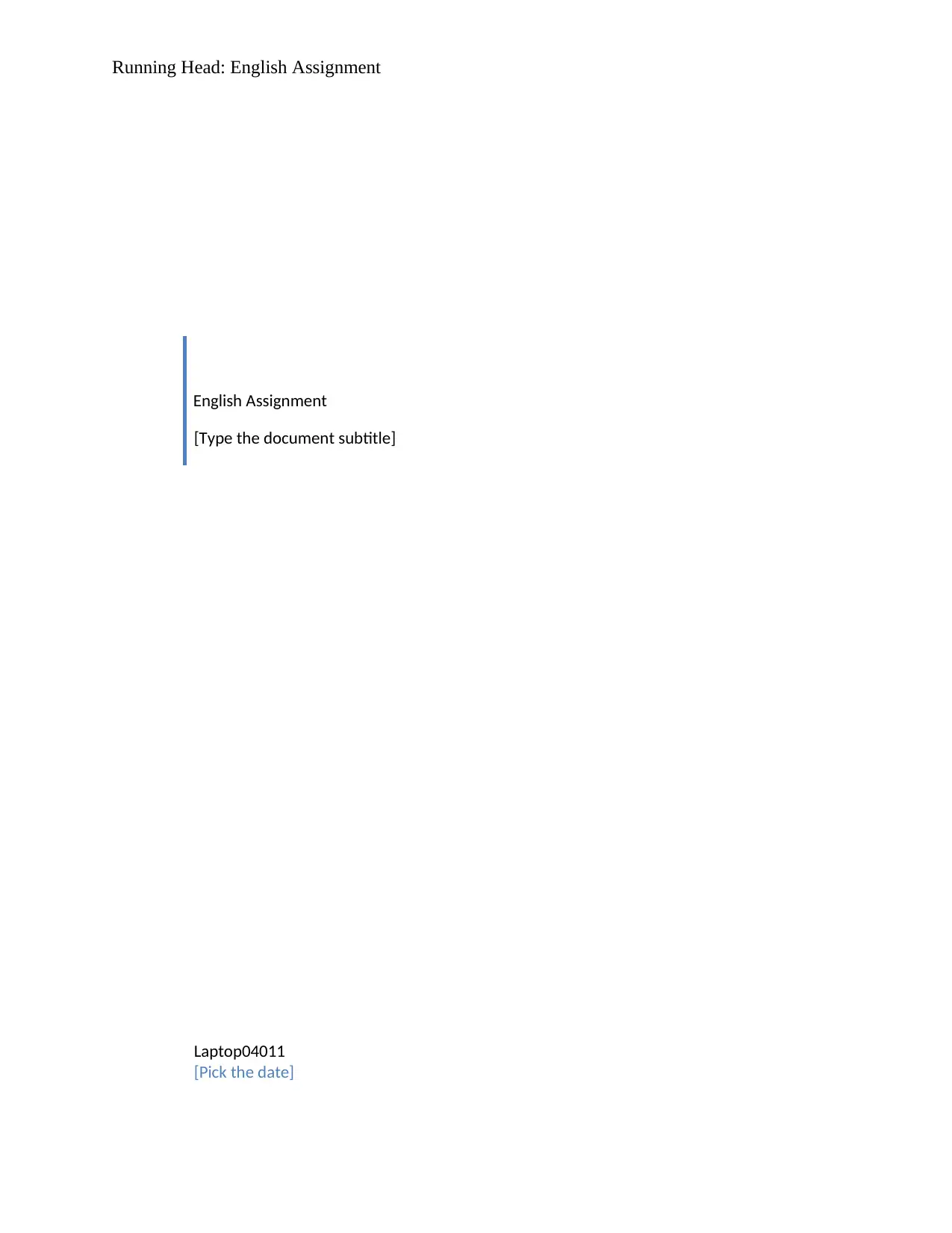
Running Head: English Assignment
English Assignment
[Type the document subtitle]
Laptop04011
[Pick the date]
English Assignment
[Type the document subtitle]
Laptop04011
[Pick the date]
Paraphrase This Document
Need a fresh take? Get an instant paraphrase of this document with our AI Paraphraser
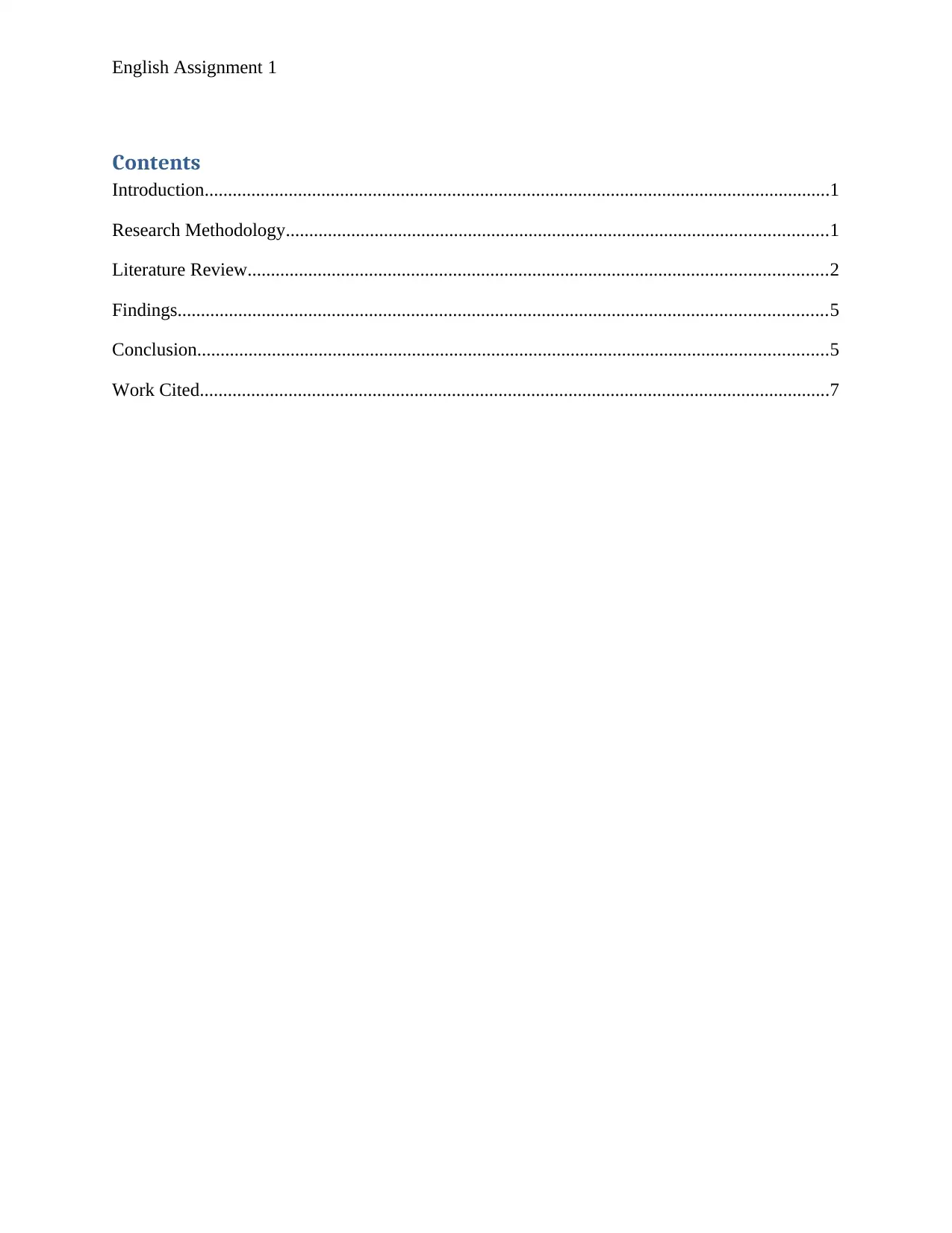
English Assignment 1
Contents
Introduction......................................................................................................................................1
Research Methodology....................................................................................................................1
Literature Review............................................................................................................................2
Findings...........................................................................................................................................5
Conclusion.......................................................................................................................................5
Work Cited.......................................................................................................................................7
Contents
Introduction......................................................................................................................................1
Research Methodology....................................................................................................................1
Literature Review............................................................................................................................2
Findings...........................................................................................................................................5
Conclusion.......................................................................................................................................5
Work Cited.......................................................................................................................................7
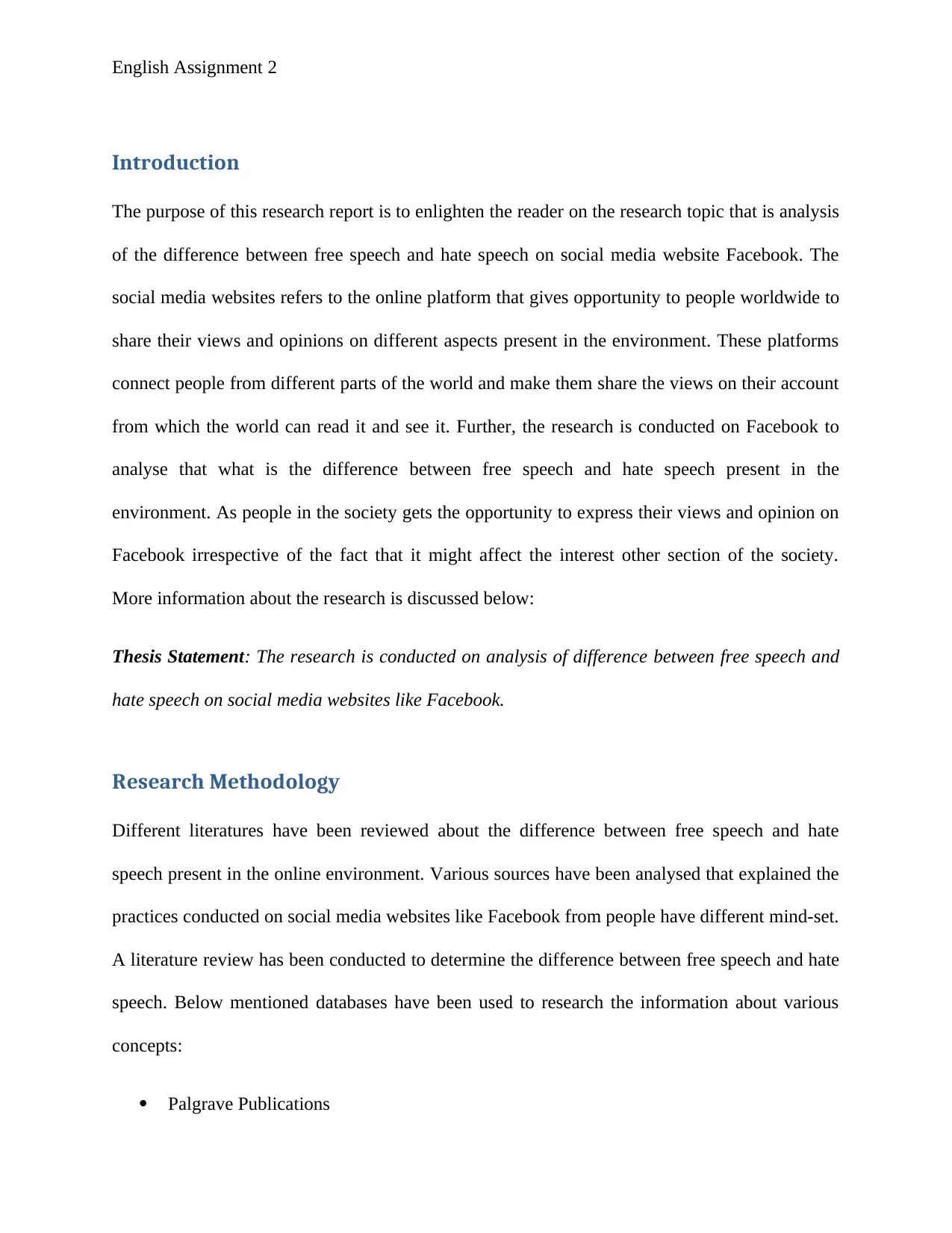
English Assignment 2
Introduction
The purpose of this research report is to enlighten the reader on the research topic that is analysis
of the difference between free speech and hate speech on social media website Facebook. The
social media websites refers to the online platform that gives opportunity to people worldwide to
share their views and opinions on different aspects present in the environment. These platforms
connect people from different parts of the world and make them share the views on their account
from which the world can read it and see it. Further, the research is conducted on Facebook to
analyse that what is the difference between free speech and hate speech present in the
environment. As people in the society gets the opportunity to express their views and opinion on
Facebook irrespective of the fact that it might affect the interest other section of the society.
More information about the research is discussed below:
Thesis Statement: The research is conducted on analysis of difference between free speech and
hate speech on social media websites like Facebook.
Research Methodology
Different literatures have been reviewed about the difference between free speech and hate
speech present in the online environment. Various sources have been analysed that explained the
practices conducted on social media websites like Facebook from people have different mind-set.
A literature review has been conducted to determine the difference between free speech and hate
speech. Below mentioned databases have been used to research the information about various
concepts:
Palgrave Publications
Introduction
The purpose of this research report is to enlighten the reader on the research topic that is analysis
of the difference between free speech and hate speech on social media website Facebook. The
social media websites refers to the online platform that gives opportunity to people worldwide to
share their views and opinions on different aspects present in the environment. These platforms
connect people from different parts of the world and make them share the views on their account
from which the world can read it and see it. Further, the research is conducted on Facebook to
analyse that what is the difference between free speech and hate speech present in the
environment. As people in the society gets the opportunity to express their views and opinion on
Facebook irrespective of the fact that it might affect the interest other section of the society.
More information about the research is discussed below:
Thesis Statement: The research is conducted on analysis of difference between free speech and
hate speech on social media websites like Facebook.
Research Methodology
Different literatures have been reviewed about the difference between free speech and hate
speech present in the online environment. Various sources have been analysed that explained the
practices conducted on social media websites like Facebook from people have different mind-set.
A literature review has been conducted to determine the difference between free speech and hate
speech. Below mentioned databases have been used to research the information about various
concepts:
Palgrave Publications
⊘ This is a preview!⊘
Do you want full access?
Subscribe today to unlock all pages.

Trusted by 1+ million students worldwide
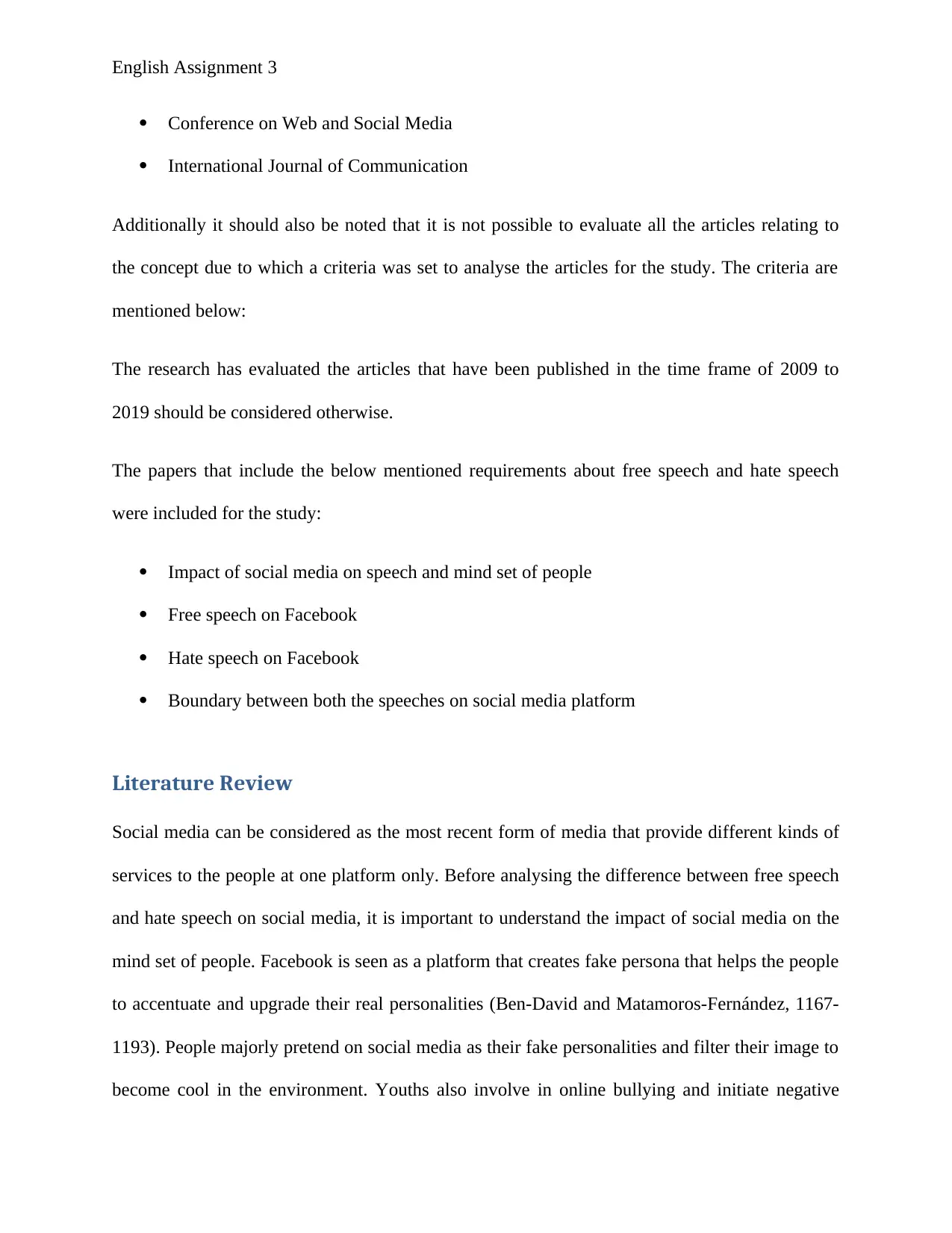
English Assignment 3
Conference on Web and Social Media
International Journal of Communication
Additionally it should also be noted that it is not possible to evaluate all the articles relating to
the concept due to which a criteria was set to analyse the articles for the study. The criteria are
mentioned below:
The research has evaluated the articles that have been published in the time frame of 2009 to
2019 should be considered otherwise.
The papers that include the below mentioned requirements about free speech and hate speech
were included for the study:
Impact of social media on speech and mind set of people
Free speech on Facebook
Hate speech on Facebook
Boundary between both the speeches on social media platform
Literature Review
Social media can be considered as the most recent form of media that provide different kinds of
services to the people at one platform only. Before analysing the difference between free speech
and hate speech on social media, it is important to understand the impact of social media on the
mind set of people. Facebook is seen as a platform that creates fake persona that helps the people
to accentuate and upgrade their real personalities (Ben-David and Matamoros-Fernández, 1167-
1193). People majorly pretend on social media as their fake personalities and filter their image to
become cool in the environment. Youths also involve in online bullying and initiate negative
Conference on Web and Social Media
International Journal of Communication
Additionally it should also be noted that it is not possible to evaluate all the articles relating to
the concept due to which a criteria was set to analyse the articles for the study. The criteria are
mentioned below:
The research has evaluated the articles that have been published in the time frame of 2009 to
2019 should be considered otherwise.
The papers that include the below mentioned requirements about free speech and hate speech
were included for the study:
Impact of social media on speech and mind set of people
Free speech on Facebook
Hate speech on Facebook
Boundary between both the speeches on social media platform
Literature Review
Social media can be considered as the most recent form of media that provide different kinds of
services to the people at one platform only. Before analysing the difference between free speech
and hate speech on social media, it is important to understand the impact of social media on the
mind set of people. Facebook is seen as a platform that creates fake persona that helps the people
to accentuate and upgrade their real personalities (Ben-David and Matamoros-Fernández, 1167-
1193). People majorly pretend on social media as their fake personalities and filter their image to
become cool in the environment. Youths also involve in online bullying and initiate negative
Paraphrase This Document
Need a fresh take? Get an instant paraphrase of this document with our AI Paraphraser
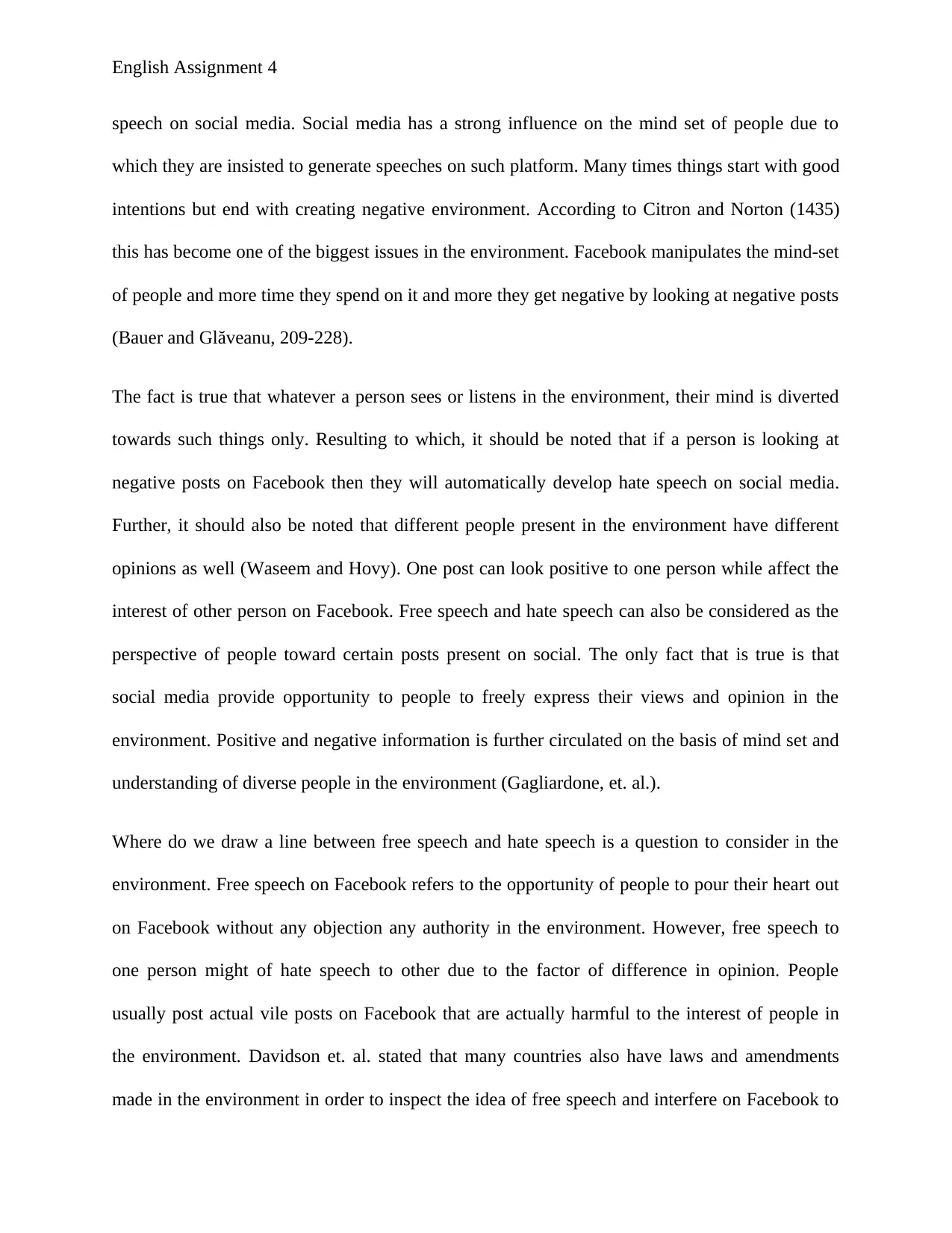
English Assignment 4
speech on social media. Social media has a strong influence on the mind set of people due to
which they are insisted to generate speeches on such platform. Many times things start with good
intentions but end with creating negative environment. According to Citron and Norton (1435)
this has become one of the biggest issues in the environment. Facebook manipulates the mind-set
of people and more time they spend on it and more they get negative by looking at negative posts
(Bauer and Glăveanu, 209-228).
The fact is true that whatever a person sees or listens in the environment, their mind is diverted
towards such things only. Resulting to which, it should be noted that if a person is looking at
negative posts on Facebook then they will automatically develop hate speech on social media.
Further, it should also be noted that different people present in the environment have different
opinions as well (Waseem and Hovy). One post can look positive to one person while affect the
interest of other person on Facebook. Free speech and hate speech can also be considered as the
perspective of people toward certain posts present on social. The only fact that is true is that
social media provide opportunity to people to freely express their views and opinion in the
environment. Positive and negative information is further circulated on the basis of mind set and
understanding of diverse people in the environment (Gagliardone, et. al.).
Where do we draw a line between free speech and hate speech is a question to consider in the
environment. Free speech on Facebook refers to the opportunity of people to pour their heart out
on Facebook without any objection any authority in the environment. However, free speech to
one person might of hate speech to other due to the factor of difference in opinion. People
usually post actual vile posts on Facebook that are actually harmful to the interest of people in
the environment. Davidson et. al. stated that many countries also have laws and amendments
made in the environment in order to inspect the idea of free speech and interfere on Facebook to
speech on social media. Social media has a strong influence on the mind set of people due to
which they are insisted to generate speeches on such platform. Many times things start with good
intentions but end with creating negative environment. According to Citron and Norton (1435)
this has become one of the biggest issues in the environment. Facebook manipulates the mind-set
of people and more time they spend on it and more they get negative by looking at negative posts
(Bauer and Glăveanu, 209-228).
The fact is true that whatever a person sees or listens in the environment, their mind is diverted
towards such things only. Resulting to which, it should be noted that if a person is looking at
negative posts on Facebook then they will automatically develop hate speech on social media.
Further, it should also be noted that different people present in the environment have different
opinions as well (Waseem and Hovy). One post can look positive to one person while affect the
interest of other person on Facebook. Free speech and hate speech can also be considered as the
perspective of people toward certain posts present on social. The only fact that is true is that
social media provide opportunity to people to freely express their views and opinion in the
environment. Positive and negative information is further circulated on the basis of mind set and
understanding of diverse people in the environment (Gagliardone, et. al.).
Where do we draw a line between free speech and hate speech is a question to consider in the
environment. Free speech on Facebook refers to the opportunity of people to pour their heart out
on Facebook without any objection any authority in the environment. However, free speech to
one person might of hate speech to other due to the factor of difference in opinion. People
usually post actual vile posts on Facebook that are actually harmful to the interest of people in
the environment. Davidson et. al. stated that many countries also have laws and amendments
made in the environment in order to inspect the idea of free speech and interfere on Facebook to
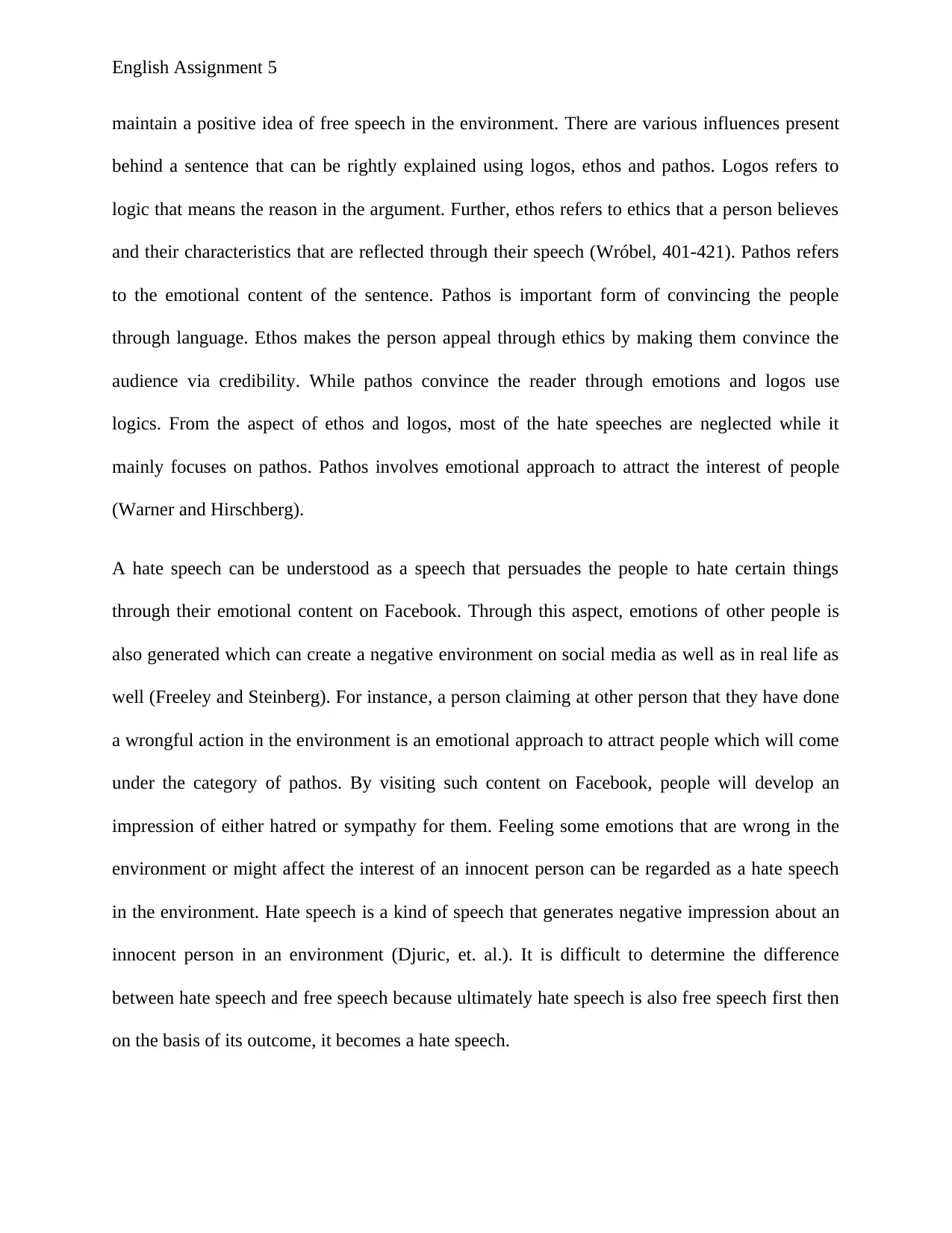
English Assignment 5
maintain a positive idea of free speech in the environment. There are various influences present
behind a sentence that can be rightly explained using logos, ethos and pathos. Logos refers to
logic that means the reason in the argument. Further, ethos refers to ethics that a person believes
and their characteristics that are reflected through their speech (Wróbel, 401-421). Pathos refers
to the emotional content of the sentence. Pathos is important form of convincing the people
through language. Ethos makes the person appeal through ethics by making them convince the
audience via credibility. While pathos convince the reader through emotions and logos use
logics. From the aspect of ethos and logos, most of the hate speeches are neglected while it
mainly focuses on pathos. Pathos involves emotional approach to attract the interest of people
(Warner and Hirschberg).
A hate speech can be understood as a speech that persuades the people to hate certain things
through their emotional content on Facebook. Through this aspect, emotions of other people is
also generated which can create a negative environment on social media as well as in real life as
well (Freeley and Steinberg). For instance, a person claiming at other person that they have done
a wrongful action in the environment is an emotional approach to attract people which will come
under the category of pathos. By visiting such content on Facebook, people will develop an
impression of either hatred or sympathy for them. Feeling some emotions that are wrong in the
environment or might affect the interest of an innocent person can be regarded as a hate speech
in the environment. Hate speech is a kind of speech that generates negative impression about an
innocent person in an environment (Djuric, et. al.). It is difficult to determine the difference
between hate speech and free speech because ultimately hate speech is also free speech first then
on the basis of its outcome, it becomes a hate speech.
maintain a positive idea of free speech in the environment. There are various influences present
behind a sentence that can be rightly explained using logos, ethos and pathos. Logos refers to
logic that means the reason in the argument. Further, ethos refers to ethics that a person believes
and their characteristics that are reflected through their speech (Wróbel, 401-421). Pathos refers
to the emotional content of the sentence. Pathos is important form of convincing the people
through language. Ethos makes the person appeal through ethics by making them convince the
audience via credibility. While pathos convince the reader through emotions and logos use
logics. From the aspect of ethos and logos, most of the hate speeches are neglected while it
mainly focuses on pathos. Pathos involves emotional approach to attract the interest of people
(Warner and Hirschberg).
A hate speech can be understood as a speech that persuades the people to hate certain things
through their emotional content on Facebook. Through this aspect, emotions of other people is
also generated which can create a negative environment on social media as well as in real life as
well (Freeley and Steinberg). For instance, a person claiming at other person that they have done
a wrongful action in the environment is an emotional approach to attract people which will come
under the category of pathos. By visiting such content on Facebook, people will develop an
impression of either hatred or sympathy for them. Feeling some emotions that are wrong in the
environment or might affect the interest of an innocent person can be regarded as a hate speech
in the environment. Hate speech is a kind of speech that generates negative impression about an
innocent person in an environment (Djuric, et. al.). It is difficult to determine the difference
between hate speech and free speech because ultimately hate speech is also free speech first then
on the basis of its outcome, it becomes a hate speech.
⊘ This is a preview!⊘
Do you want full access?
Subscribe today to unlock all pages.

Trusted by 1+ million students worldwide
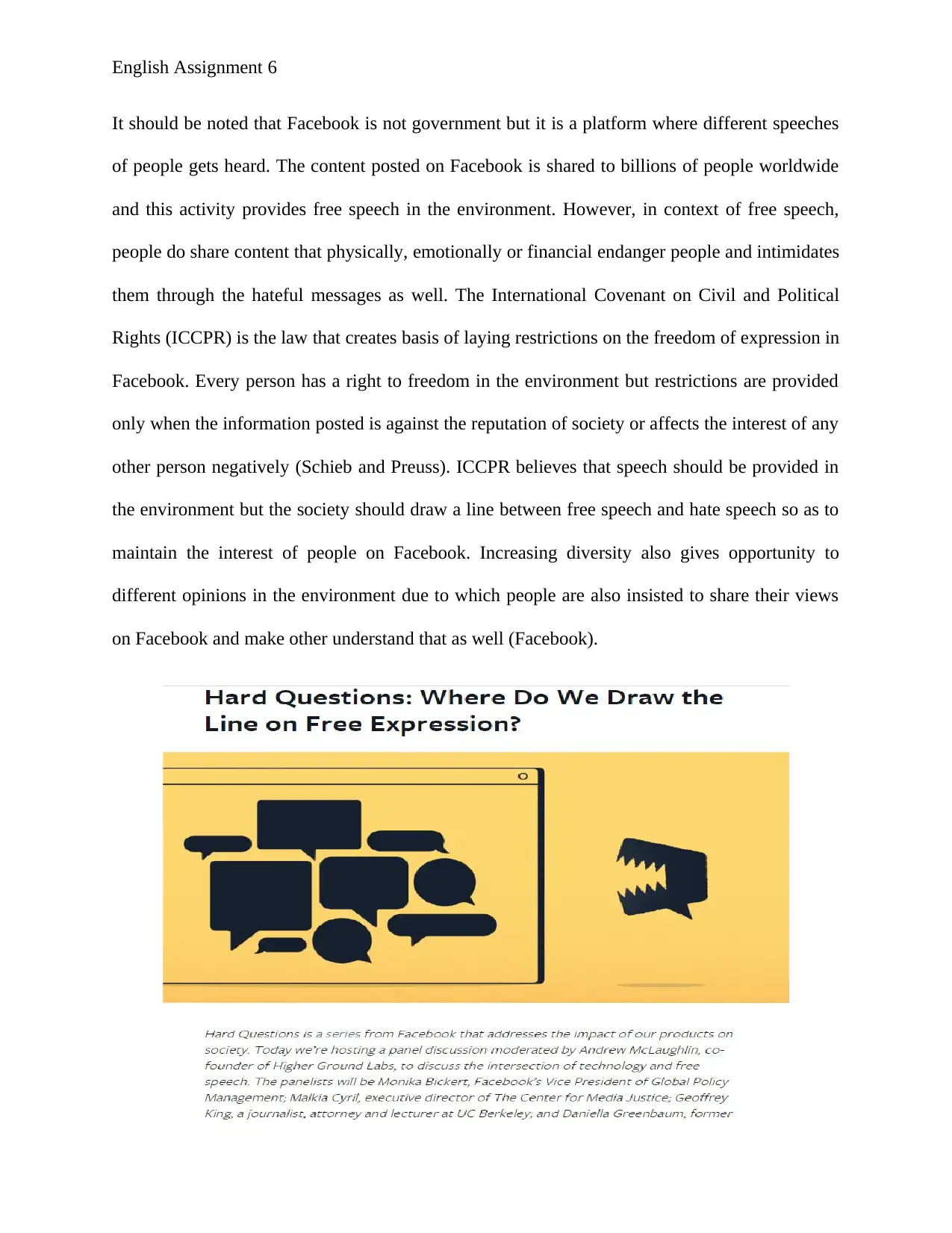
English Assignment 6
It should be noted that Facebook is not government but it is a platform where different speeches
of people gets heard. The content posted on Facebook is shared to billions of people worldwide
and this activity provides free speech in the environment. However, in context of free speech,
people do share content that physically, emotionally or financial endanger people and intimidates
them through the hateful messages as well. The International Covenant on Civil and Political
Rights (ICCPR) is the law that creates basis of laying restrictions on the freedom of expression in
Facebook. Every person has a right to freedom in the environment but restrictions are provided
only when the information posted is against the reputation of society or affects the interest of any
other person negatively (Schieb and Preuss). ICCPR believes that speech should be provided in
the environment but the society should draw a line between free speech and hate speech so as to
maintain the interest of people on Facebook. Increasing diversity also gives opportunity to
different opinions in the environment due to which people are also insisted to share their views
on Facebook and make other understand that as well (Facebook).
It should be noted that Facebook is not government but it is a platform where different speeches
of people gets heard. The content posted on Facebook is shared to billions of people worldwide
and this activity provides free speech in the environment. However, in context of free speech,
people do share content that physically, emotionally or financial endanger people and intimidates
them through the hateful messages as well. The International Covenant on Civil and Political
Rights (ICCPR) is the law that creates basis of laying restrictions on the freedom of expression in
Facebook. Every person has a right to freedom in the environment but restrictions are provided
only when the information posted is against the reputation of society or affects the interest of any
other person negatively (Schieb and Preuss). ICCPR believes that speech should be provided in
the environment but the society should draw a line between free speech and hate speech so as to
maintain the interest of people on Facebook. Increasing diversity also gives opportunity to
different opinions in the environment due to which people are also insisted to share their views
on Facebook and make other understand that as well (Facebook).
Paraphrase This Document
Need a fresh take? Get an instant paraphrase of this document with our AI Paraphraser
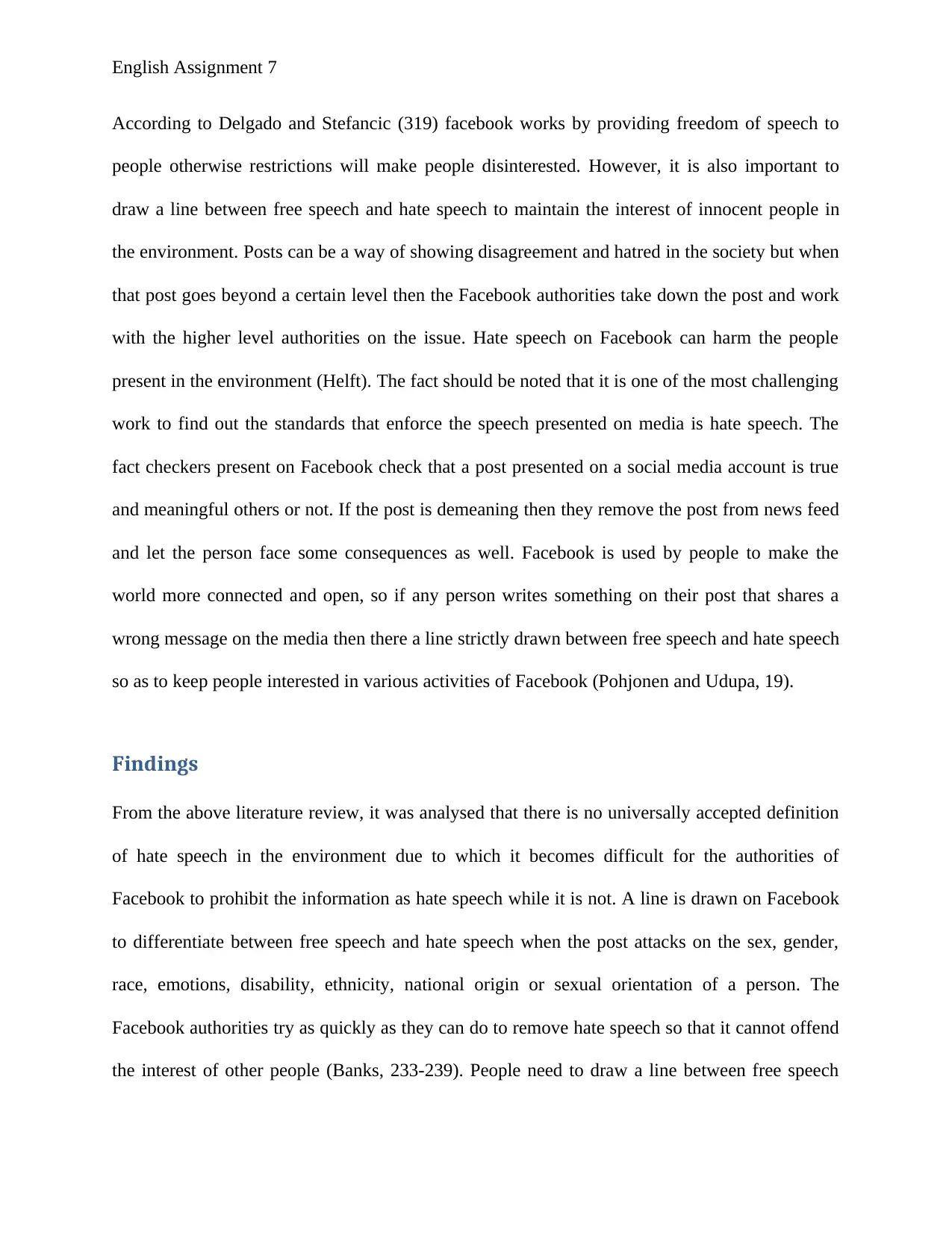
English Assignment 7
According to Delgado and Stefancic (319) facebook works by providing freedom of speech to
people otherwise restrictions will make people disinterested. However, it is also important to
draw a line between free speech and hate speech to maintain the interest of innocent people in
the environment. Posts can be a way of showing disagreement and hatred in the society but when
that post goes beyond a certain level then the Facebook authorities take down the post and work
with the higher level authorities on the issue. Hate speech on Facebook can harm the people
present in the environment (Helft). The fact should be noted that it is one of the most challenging
work to find out the standards that enforce the speech presented on media is hate speech. The
fact checkers present on Facebook check that a post presented on a social media account is true
and meaningful others or not. If the post is demeaning then they remove the post from news feed
and let the person face some consequences as well. Facebook is used by people to make the
world more connected and open, so if any person writes something on their post that shares a
wrong message on the media then there a line strictly drawn between free speech and hate speech
so as to keep people interested in various activities of Facebook (Pohjonen and Udupa, 19).
Findings
From the above literature review, it was analysed that there is no universally accepted definition
of hate speech in the environment due to which it becomes difficult for the authorities of
Facebook to prohibit the information as hate speech while it is not. A line is drawn on Facebook
to differentiate between free speech and hate speech when the post attacks on the sex, gender,
race, emotions, disability, ethnicity, national origin or sexual orientation of a person. The
Facebook authorities try as quickly as they can do to remove hate speech so that it cannot offend
the interest of other people (Banks, 233-239). People need to draw a line between free speech
According to Delgado and Stefancic (319) facebook works by providing freedom of speech to
people otherwise restrictions will make people disinterested. However, it is also important to
draw a line between free speech and hate speech to maintain the interest of innocent people in
the environment. Posts can be a way of showing disagreement and hatred in the society but when
that post goes beyond a certain level then the Facebook authorities take down the post and work
with the higher level authorities on the issue. Hate speech on Facebook can harm the people
present in the environment (Helft). The fact should be noted that it is one of the most challenging
work to find out the standards that enforce the speech presented on media is hate speech. The
fact checkers present on Facebook check that a post presented on a social media account is true
and meaningful others or not. If the post is demeaning then they remove the post from news feed
and let the person face some consequences as well. Facebook is used by people to make the
world more connected and open, so if any person writes something on their post that shares a
wrong message on the media then there a line strictly drawn between free speech and hate speech
so as to keep people interested in various activities of Facebook (Pohjonen and Udupa, 19).
Findings
From the above literature review, it was analysed that there is no universally accepted definition
of hate speech in the environment due to which it becomes difficult for the authorities of
Facebook to prohibit the information as hate speech while it is not. A line is drawn on Facebook
to differentiate between free speech and hate speech when the post attacks on the sex, gender,
race, emotions, disability, ethnicity, national origin or sexual orientation of a person. The
Facebook authorities try as quickly as they can do to remove hate speech so that it cannot offend
the interest of other people (Banks, 233-239). People need to draw a line between free speech
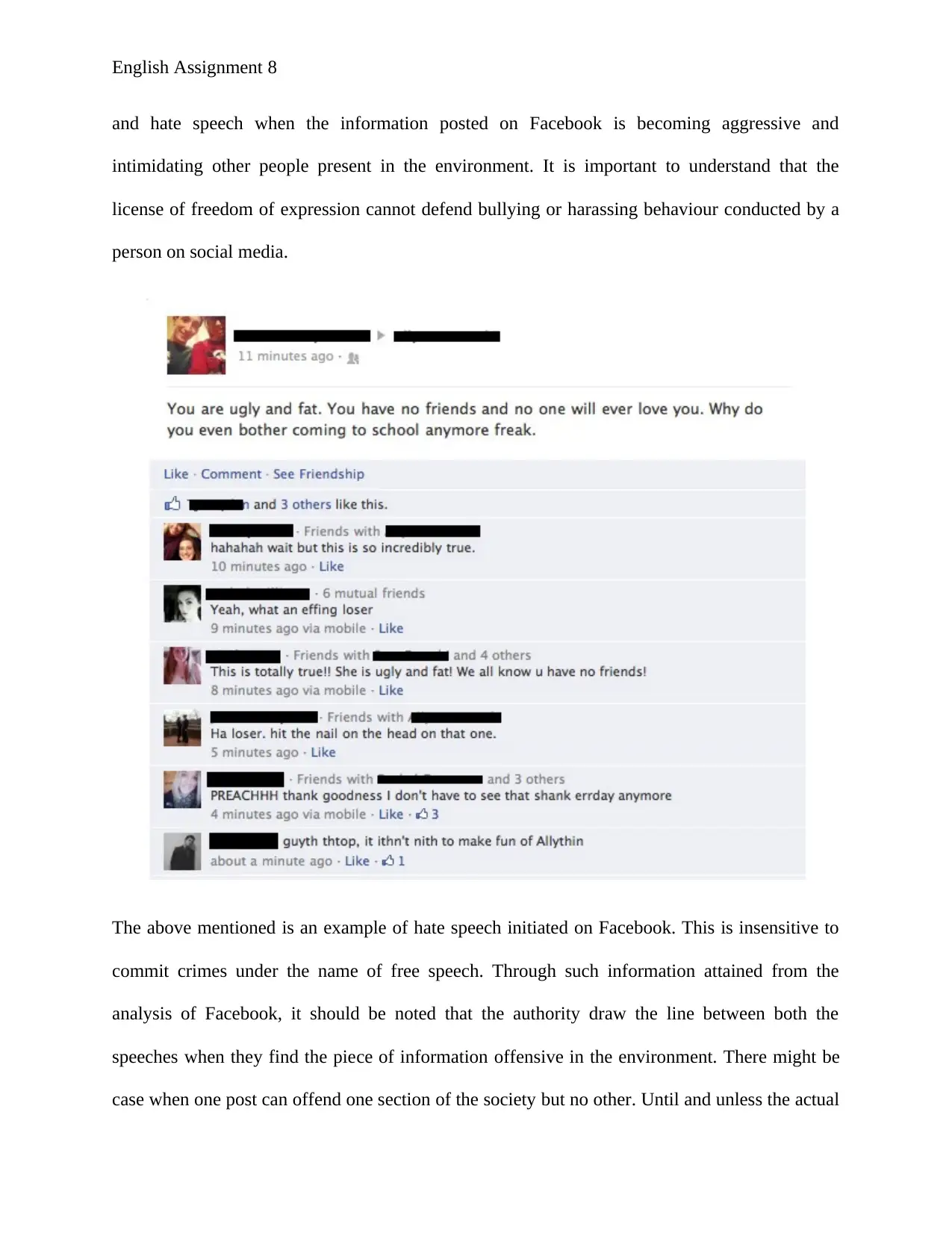
English Assignment 8
and hate speech when the information posted on Facebook is becoming aggressive and
intimidating other people present in the environment. It is important to understand that the
license of freedom of expression cannot defend bullying or harassing behaviour conducted by a
person on social media.
The above mentioned is an example of hate speech initiated on Facebook. This is insensitive to
commit crimes under the name of free speech. Through such information attained from the
analysis of Facebook, it should be noted that the authority draw the line between both the
speeches when they find the piece of information offensive in the environment. There might be
case when one post can offend one section of the society but no other. Until and unless the actual
and hate speech when the information posted on Facebook is becoming aggressive and
intimidating other people present in the environment. It is important to understand that the
license of freedom of expression cannot defend bullying or harassing behaviour conducted by a
person on social media.
The above mentioned is an example of hate speech initiated on Facebook. This is insensitive to
commit crimes under the name of free speech. Through such information attained from the
analysis of Facebook, it should be noted that the authority draw the line between both the
speeches when they find the piece of information offensive in the environment. There might be
case when one post can offend one section of the society but no other. Until and unless the actual
⊘ This is a preview!⊘
Do you want full access?
Subscribe today to unlock all pages.

Trusted by 1+ million students worldwide
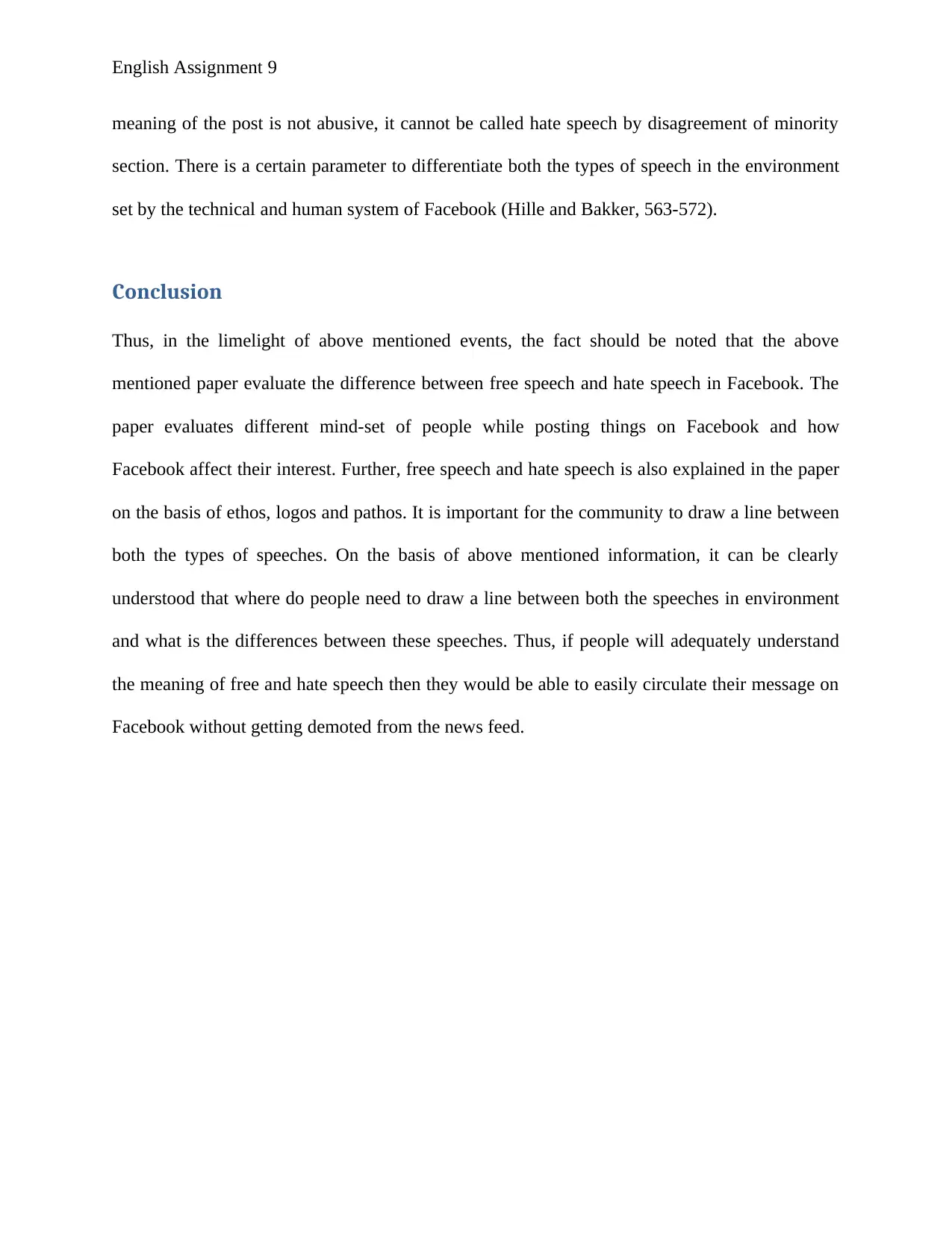
English Assignment 9
meaning of the post is not abusive, it cannot be called hate speech by disagreement of minority
section. There is a certain parameter to differentiate both the types of speech in the environment
set by the technical and human system of Facebook (Hille and Bakker, 563-572).
Conclusion
Thus, in the limelight of above mentioned events, the fact should be noted that the above
mentioned paper evaluate the difference between free speech and hate speech in Facebook. The
paper evaluates different mind-set of people while posting things on Facebook and how
Facebook affect their interest. Further, free speech and hate speech is also explained in the paper
on the basis of ethos, logos and pathos. It is important for the community to draw a line between
both the types of speeches. On the basis of above mentioned information, it can be clearly
understood that where do people need to draw a line between both the speeches in environment
and what is the differences between these speeches. Thus, if people will adequately understand
the meaning of free and hate speech then they would be able to easily circulate their message on
Facebook without getting demoted from the news feed.
meaning of the post is not abusive, it cannot be called hate speech by disagreement of minority
section. There is a certain parameter to differentiate both the types of speech in the environment
set by the technical and human system of Facebook (Hille and Bakker, 563-572).
Conclusion
Thus, in the limelight of above mentioned events, the fact should be noted that the above
mentioned paper evaluate the difference between free speech and hate speech in Facebook. The
paper evaluates different mind-set of people while posting things on Facebook and how
Facebook affect their interest. Further, free speech and hate speech is also explained in the paper
on the basis of ethos, logos and pathos. It is important for the community to draw a line between
both the types of speeches. On the basis of above mentioned information, it can be clearly
understood that where do people need to draw a line between both the speeches in environment
and what is the differences between these speeches. Thus, if people will adequately understand
the meaning of free and hate speech then they would be able to easily circulate their message on
Facebook without getting demoted from the news feed.
Paraphrase This Document
Need a fresh take? Get an instant paraphrase of this document with our AI Paraphraser
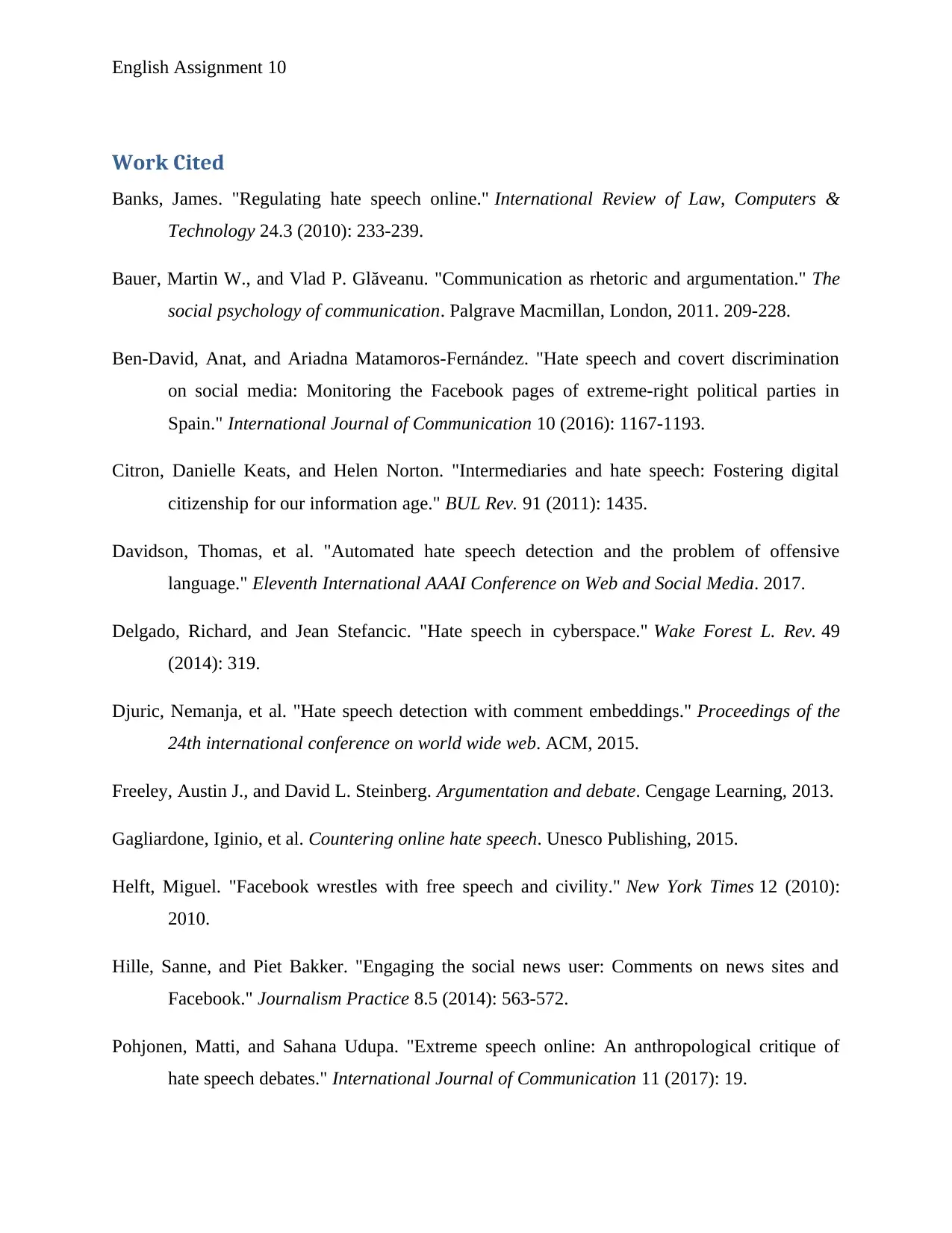
English Assignment 10
Work Cited
Banks, James. "Regulating hate speech online." International Review of Law, Computers &
Technology 24.3 (2010): 233-239.
Bauer, Martin W., and Vlad P. Glăveanu. "Communication as rhetoric and argumentation." The
social psychology of communication. Palgrave Macmillan, London, 2011. 209-228.
Ben-David, Anat, and Ariadna Matamoros-Fernández. "Hate speech and covert discrimination
on social media: Monitoring the Facebook pages of extreme-right political parties in
Spain." International Journal of Communication 10 (2016): 1167-1193.
Citron, Danielle Keats, and Helen Norton. "Intermediaries and hate speech: Fostering digital
citizenship for our information age." BUL Rev. 91 (2011): 1435.
Davidson, Thomas, et al. "Automated hate speech detection and the problem of offensive
language." Eleventh International AAAI Conference on Web and Social Media. 2017.
Delgado, Richard, and Jean Stefancic. "Hate speech in cyberspace." Wake Forest L. Rev. 49
(2014): 319.
Djuric, Nemanja, et al. "Hate speech detection with comment embeddings." Proceedings of the
24th international conference on world wide web. ACM, 2015.
Freeley, Austin J., and David L. Steinberg. Argumentation and debate. Cengage Learning, 2013.
Gagliardone, Iginio, et al. Countering online hate speech. Unesco Publishing, 2015.
Helft, Miguel. "Facebook wrestles with free speech and civility." New York Times 12 (2010):
2010.
Hille, Sanne, and Piet Bakker. "Engaging the social news user: Comments on news sites and
Facebook." Journalism Practice 8.5 (2014): 563-572.
Pohjonen, Matti, and Sahana Udupa. "Extreme speech online: An anthropological critique of
hate speech debates." International Journal of Communication 11 (2017): 19.
Work Cited
Banks, James. "Regulating hate speech online." International Review of Law, Computers &
Technology 24.3 (2010): 233-239.
Bauer, Martin W., and Vlad P. Glăveanu. "Communication as rhetoric and argumentation." The
social psychology of communication. Palgrave Macmillan, London, 2011. 209-228.
Ben-David, Anat, and Ariadna Matamoros-Fernández. "Hate speech and covert discrimination
on social media: Monitoring the Facebook pages of extreme-right political parties in
Spain." International Journal of Communication 10 (2016): 1167-1193.
Citron, Danielle Keats, and Helen Norton. "Intermediaries and hate speech: Fostering digital
citizenship for our information age." BUL Rev. 91 (2011): 1435.
Davidson, Thomas, et al. "Automated hate speech detection and the problem of offensive
language." Eleventh International AAAI Conference on Web and Social Media. 2017.
Delgado, Richard, and Jean Stefancic. "Hate speech in cyberspace." Wake Forest L. Rev. 49
(2014): 319.
Djuric, Nemanja, et al. "Hate speech detection with comment embeddings." Proceedings of the
24th international conference on world wide web. ACM, 2015.
Freeley, Austin J., and David L. Steinberg. Argumentation and debate. Cengage Learning, 2013.
Gagliardone, Iginio, et al. Countering online hate speech. Unesco Publishing, 2015.
Helft, Miguel. "Facebook wrestles with free speech and civility." New York Times 12 (2010):
2010.
Hille, Sanne, and Piet Bakker. "Engaging the social news user: Comments on news sites and
Facebook." Journalism Practice 8.5 (2014): 563-572.
Pohjonen, Matti, and Sahana Udupa. "Extreme speech online: An anthropological critique of
hate speech debates." International Journal of Communication 11 (2017): 19.
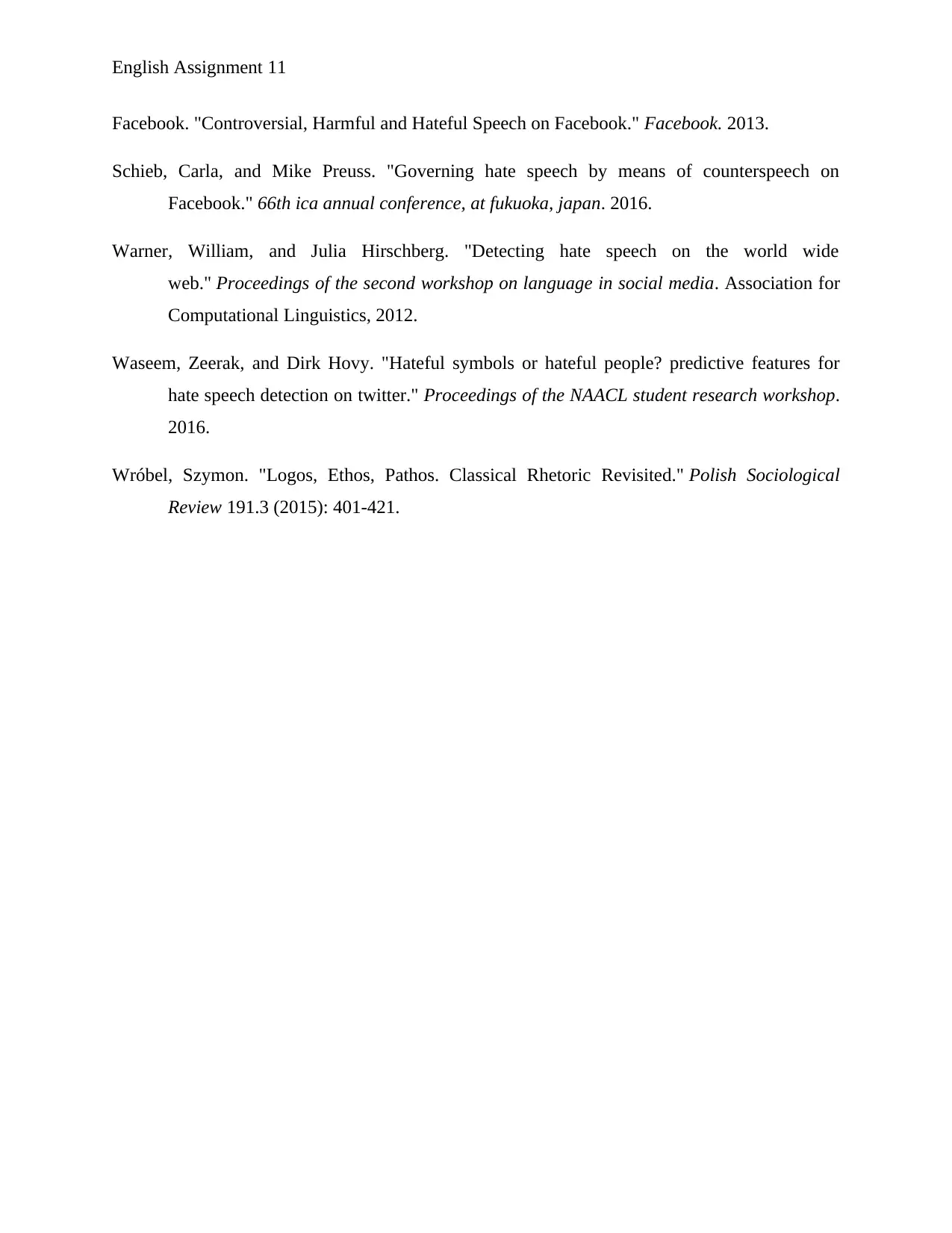
English Assignment 11
Facebook. "Controversial, Harmful and Hateful Speech on Facebook." Facebook. 2013.
Schieb, Carla, and Mike Preuss. "Governing hate speech by means of counterspeech on
Facebook." 66th ica annual conference, at fukuoka, japan. 2016.
Warner, William, and Julia Hirschberg. "Detecting hate speech on the world wide
web." Proceedings of the second workshop on language in social media. Association for
Computational Linguistics, 2012.
Waseem, Zeerak, and Dirk Hovy. "Hateful symbols or hateful people? predictive features for
hate speech detection on twitter." Proceedings of the NAACL student research workshop.
2016.
Wróbel, Szymon. "Logos, Ethos, Pathos. Classical Rhetoric Revisited." Polish Sociological
Review 191.3 (2015): 401-421.
Facebook. "Controversial, Harmful and Hateful Speech on Facebook." Facebook. 2013.
Schieb, Carla, and Mike Preuss. "Governing hate speech by means of counterspeech on
Facebook." 66th ica annual conference, at fukuoka, japan. 2016.
Warner, William, and Julia Hirschberg. "Detecting hate speech on the world wide
web." Proceedings of the second workshop on language in social media. Association for
Computational Linguistics, 2012.
Waseem, Zeerak, and Dirk Hovy. "Hateful symbols or hateful people? predictive features for
hate speech detection on twitter." Proceedings of the NAACL student research workshop.
2016.
Wróbel, Szymon. "Logos, Ethos, Pathos. Classical Rhetoric Revisited." Polish Sociological
Review 191.3 (2015): 401-421.
⊘ This is a preview!⊘
Do you want full access?
Subscribe today to unlock all pages.

Trusted by 1+ million students worldwide
1 out of 12
Related Documents
Your All-in-One AI-Powered Toolkit for Academic Success.
+13062052269
info@desklib.com
Available 24*7 on WhatsApp / Email
![[object Object]](/_next/static/media/star-bottom.7253800d.svg)
Unlock your academic potential
Copyright © 2020–2026 A2Z Services. All Rights Reserved. Developed and managed by ZUCOL.





